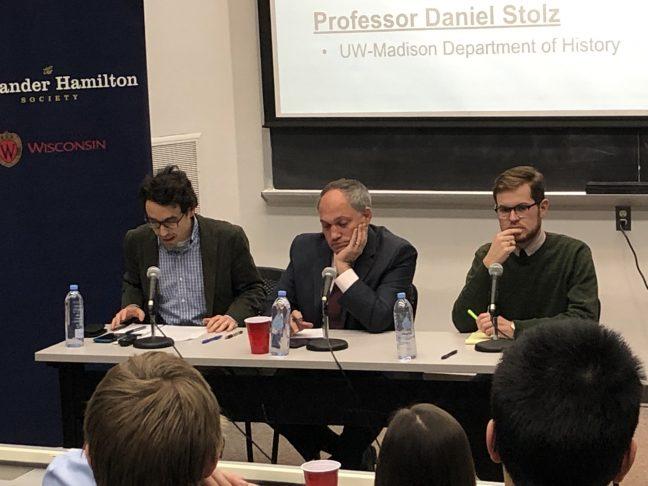The Alexander Hamilton Society hosted two experts Wednesday night in a lecture titled “Political Chess in the Middle East,” specifically between Saudi Arabia and Iran.
University of Wisconsin history professor Daniel Stolz began the discussion with a “provocation”: President Donald Trump’s policies in the Middle East are conventional for an American president.
Stolz said that while Trump has made some “headline-grabbing” moves in the Middle East, like moving the U.S. Embassy in Israel to Jerusalem and his tepid response following the Saudi government-orchestrated killing of Jamal Khashoggi, his fundamental policy is very similar to presidents of the past. Stolz believed former President Barack Obama wouldn’t have reacted in any different, substantive way to Khashoggi’s execution.
“[Trump’s policies] are consistent with decades of American policy in the Middle East, in particular the steadfast commitment to Saudi government and to containing the Iranian Revolution,” Stolz said.
Trump’s ‘erratic’ policies make future of Middle East uncertain, speaker says
Michael Rubin, a scholar at the American Enterprise Institute, a conservative think tank, agreed with Stolz, saying there is “far more consistency” than the press makes it seem.
What makes Trump different from other presidents, Rubin said, is his style.
“When it comes to style, I would say that President Trump is much closer to a Gulf Arab leader,” Rubin said. “He surrounds himself with generals, he refuses to divest from family businesses, there is an amorphous chain of command among family members … and he bashes the press mercilessly.”
Rubin also said there is a large gap between how America’s culture operates and how these cultures operate.
The problem was further complicated by the fact that militant groups have been and are currently allied with Iran, Rubin said.
“Fundamentally, we need to recognize that different cultures can think in very, very different ways, and the worst thing we can do analytically is project our own thoughts onto others,” Rubin said. “I am not saying that all Iranians are homogeneous … but it is the guys with the guns that matter, and within that context, that ideology matters.”
Vox co-founder finds Trump to be conventional on domestic policy, troubling on foreign policy
One of the final points brought up by Stolz was whether the arms deal between America and Saudi Arabia was moral. One concern that complicates the moral equation is whether Saudi Arabia will simply get their weapons from someone else if America ends their deal.
Rubin said it depends on the scale of the weapons. If they are smaller weapons such as firearms, it is possible Saudi Arabia could get them elsewhere. But when it comes to larger scale weapons like fighter jets, it would be more difficult for Saudi Arabia to replace them.
Stolz said Americans should be looking at the big picture.
“In moral terms, the debate over whether we should be selling people weapons to do horrible things so that someone else cannot sell them weapons to do horrible things is just a bizarre debate,” Stolz said.





















